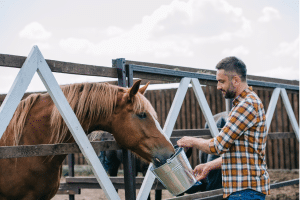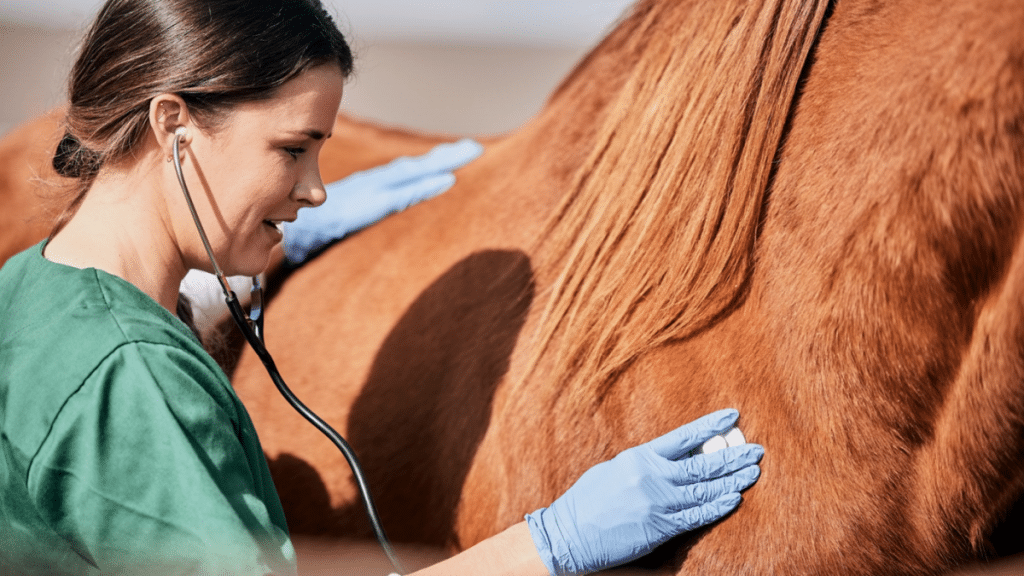As a horse owner, you must keep them healthy and strong, but ensuring they’re always on top of their health can be challenging. Horses are unique animals with specific needs that require dedicated attention and care to prevent potential health issues.
This comprehensive guide offers practical tips to help you navigate the various aspects of horse care. Following these recommendations can create an optimal environment for your horse to thrive and live a long, healthy life. Implementing these measures will benefit your horse and strengthen the bond you share with your equine companion.

Providing a Suitable Living Environment
Ensuring your horse’s well-being starts with creating a comfortable and safe living space. Key considerations include:
- Adequate Space – Horses are social animals with an instinct to roam. Confined spaces can lead to boredom, anxiety, and even physical ailments. Provide ample turnout paddocks or pastures for grazing and exercise.
- Cleanliness and Sanitation – Without strict adherence to cleanliness, there is a higher risk of diseases and parasite infestations. Fly infestations are common in stables, especially if cleanliness is not a priority. However, you can effectively manage pest populations with the right fly control measures and appropriate methods.
- Fresh Water – A constant fresh water supply is vital for your horse’s health. Monitor their water intake, especially during hot weather or periods of exertion.
- Shelter – Horses need protection from the elements. Provide a well-ventilated stable or shelter with a sturdy roof and three walls for shade and protection from wind, rain, or harsh sunlight.
Balanced Nutrition for Optimal Health
A nutritious diet is the foundation of your horse’s health. The dietary requirements may vary based on age, breed, activity level, and overall health condition. However, some general principles apply:
- Source of Fiber – Forage, such as grass hay or high-quality pasture, should be the primary component of your horse’s diet. Fiber is essential for proper digestion, and foraging keeps your horse occupied throughout the day.
- Source of Energy – Grains, like oats or barley, are concentrated energy sources. The amount of grain you feed your horse should be adjusted according to its workload and energy requirements. Seek guidance from an equine nutritionist to determine the appropriate type and quantity of grain, especially if the horse is engaged in rigorous activities like horse racing, as it may affect its performance and recovery.
- Minerals and Vitamins – Minerals and vitamins support your horse’s overall health. Salt licks can help replenish essential electrolytes like sodium and chloride lost through sweat and help maintain proper muscle function and hydration levels. Key nutrients like calcium, phosphorus, zinc, and various B vitamins support strong bones, a healthy immune system, and optimal metabolic function are also essential.
Preventive Care
Proactive preventive measures can go a long way in minimizing the risk of health problems in horses. Several important areas to focus on include:
- Vaccinations – Follow your veterinarian’s recommendations for vaccinating your horse against common equine diseases. This helps protect your horse from potentially life-threatening illnesses.
- Deworming – Internal parasites can rob your horse of essential nutrients and compromise their health. As your veterinarian advises, regular deworming is crucial for controlling these parasites.
- Dental Care – Horses’ teeth grow continuously throughout their lives. Regular dental checkups and floating (filing down sharp edges) by a qualified equine dentist are necessary to maintain proper chewing function.
- Hoof Care – Maintaining the hoof is essential for your horse’s mobility and comfort. Schedule regular visits with a farrier or horseshoer to appropriately trim and shape your horse’s hooves. Neglecting hoof care can lead to pain, lameness, and long-term complications.
Exercise and Mental Stimulation
Horses are intelligent and athletic creatures that need regular physical movement and mental stimulation to thrive. Ensuring their well-being goes beyond just meeting their basic needs—it involves catering to their physical and psychological demands.
- Daily Turnout Time – Exercise such as turnout time allows your horse to move freely, engage in natural behaviors, and socialize with other horses. Additionally, incorporate activities like riding, lunging, or obstacle courses to provide targeted exercise suitable to your horse’s capabilities and activity level and to prevent boredom.
- Mental Stimulation – Provide enrichment activities to stimulate your horse’s mind. To keep them occupied and reduce stress, offer objects to explore, like forage toys or puzzle feeders.
Recognizing Signs of Potential Health Issues
Horses are good at hiding discomfort or illness, so developing a keen eye for subtle changes in their behavior or physical appearance is essential. Catching potential health issues can lead to prompt treatment and better outcomes.
- Monitor Behavior Closely – Appetite, water intake, activity level, or mood changes can indicate underlying problems. Notice how your horse interacts with its environment and other horses, as unusual behavior may signal discomfort or distress.
- Familiarizing with Normal Vital Signs – Regularly monitoring your horse’s vital signs, such as temperature, pulse rate, and respiration rate, ensures that you can detect subtle changes in its health condition and take proactive steps to address any potential health issues before they escalate.
- Observe the Body Language – Signs like pinned ears, tail swishing, or pawing can indicate pain, anxiety, or displeasure. Observing body language is not just about identifying distress but also about recognizing signs of contentment and happiness. A relaxed posture, soft eye expression, and a willingness to engage can indicate a calm and comfortable state of mind.
Conclusion
Diligently following the tips and practices discussed here will help promote your horse’s well-being and allow them to live a long, healthy life. Regular monitoring, proper nutrition, adequate exercise, and prompt attention to health concerns will maintain your horse’s health.
Remember, caring for your equine companion is a continuous journey that requires dedication and vigilance. In the long run, you’ll be rewarded with years of companionship and cherished memories with them.
John Miller
John Miller is an avid horse enthusiast with over 15 years of experience caring for horses on his family’s ranch. With a deep passion for these magnificent animals, he has dedicated countless hours to studying and implementing best practices for horse welfare. John enjoys sharing his knowledge to help fellow horse owners provide the best possible care for their equine companions.

